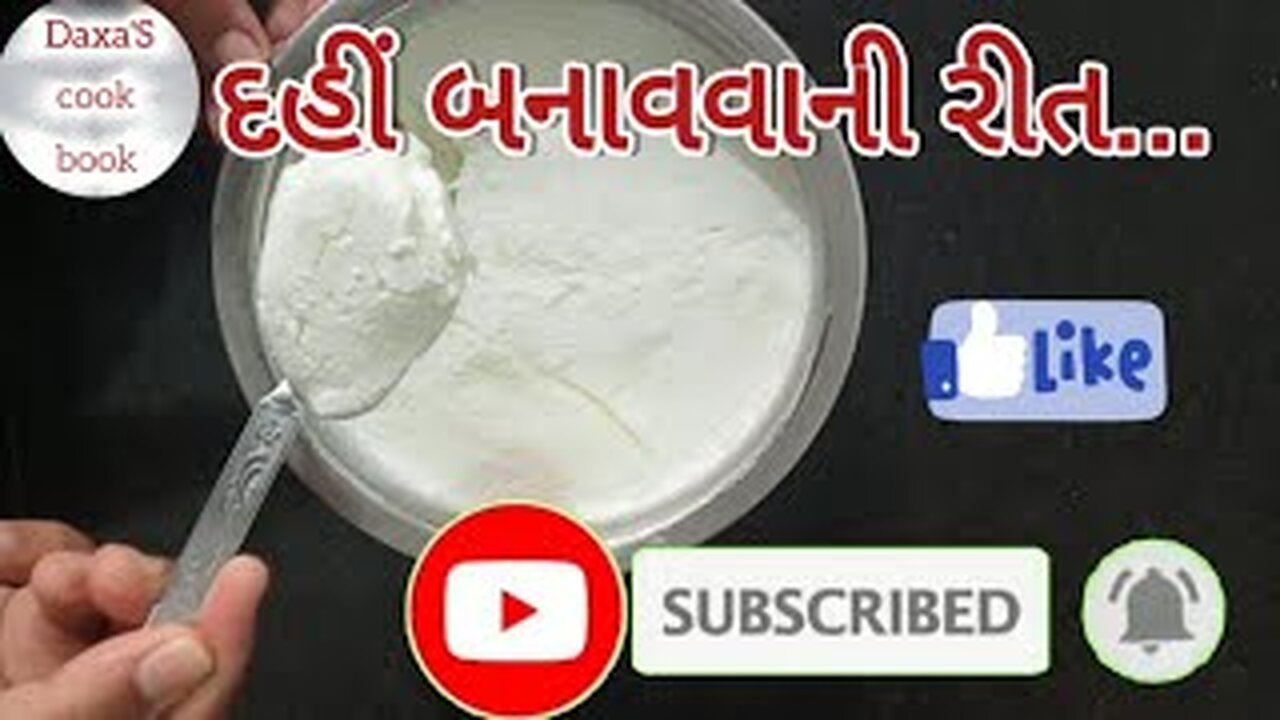Premium Only Content

દહીં બનાવવાની રીત|How To Make Curd without Milk Powder | Dahi | Homemade | Curd #Daxa's cook book
HOLI SPECIAL | How To Make Curd | Dahi | Homemade | Receipe | Daxa's_cook_book #viral #trending #support #ytshort
◆◆ Ingredients ◆◆
● ½ litre whole milk
● 1 to 2 teaspoons Curd (dahi or yogurt) to be used as a starter
◆◆ Instructions ◆◆
◆◆ Boil Milk ◆◆
● Rinse a thick bottomed pan or saucepan with clean water.
● Pour milk into it and heat it on the stovetop on a medium-low to medium heat.
● Stir a couple of times when the milk is getting heated so that the milk does not get burnt from the bottom.
● When the milk comes to a boil, it will start rising. Before it spills out of the pan, switch off the heat. Set the pan aside on the kitchen countertop.
● Let the milk become warm at room temperature.
● To check if the milk has become warm dip your little finger (touch method) into the milk and you should feel warm and not hot. Second way is to touch the sides of the pan and it should feel warm and not hot.
● The third way is to check with a food thermometer and it should have a temperature between 39 to 44 degrees Celsius or 102 to 111 degree Fahrenheit.
● Once the milk has become warm, you can use the same pan for setting curd or transfer the warm milk in another bowl.
◆◆ Make Curd ◆◆
● Add 1 teaspoon of curd starter to the milk and mix thoroughly with a small wired whisk.
● Cover with lid and allow the milk to ferment for 5 to 6 hours or until the curd is set
● Depending on the temperature it may take more hours. You can also use Instant pot yogurt function to set the curd.
● On fermentation the curd will have a pleasant fermented aroma and with a slight tangy taste and it will also have a wobbly thick texture.
● Once the curd is made, refrigerate it so that it does not get overfermented.
● If you need sour curd for any recipe then keep the curd for a couple of hours at room temperature.
● This will lead to more fermentation and the curd will become sour or very sour.
● You can eat this curd with your meals. You can also add it to variety of recipes like curd rice, buttermilk, lassi, kadhi, mor kuzhambu, dahi kabab, dahi vada, dahi bhalla, biryani, paneer tikka or make raita with it.
◆◆ Storage ◆◆
● As soon as the curd is set and fermented well, place it in the refrigerator covered with a lid. Use a clean dry spoon to remove the curd and place the bowl or container back in the fridge.
● Homemade yogurt or dahi keeps well in the fridge for about 4 to 5 days.
◆◆ Notes ◆◆
● Use whole milk as it makes for a thick creamy curd.
● In hot Indian summers, this method works for me. Use pasteurized milk or raw milk that has been boiled earlier and which is refrigerated. Remove this cold milk from the fridge, mix the starter with it. Cover the bowl and let the mixture ferment for 5 to 6 hours or as needed. This saves a bit of time as you don't need to heat the milk. But note that this method only works in a hot or warm climate. Please don't use this method with raw milk or milk that has not been pasteurized or boiled earlier as it may have some harmful microorganisms. These microorganisms are destroyed when the milk is boiled.
● Make sure that the milk is warm before you mix the starter. Hot milk will kill the bacteria in the starter and you won't get a properly fermented curd.
● In winters or cold climates ensure that you are not adding curd culture to milk that has cooled down. If the milk is cold, then the curd won’t set at all in the winters.
● It is very important to dissolve the curd culture uniformly in the milk. Whisk very well with a spoon or a wired whisk.
● Once the curd is set then refrigerate for a couple of days.
● To keep the starter ongoing remove a few spoons from the curd and either refrigerate or freeze it in a small covered bowl.
● If you don't have any starter then buy packaged starters available in health stores or online stores or supermarkets.
● The recipe can be scaled. You can make a small amount or big batch according to your needs.
◆◆ Nutrition ◆◆
Calories: 304kcal | Carbohydrates: 23g | Protein: 17g | Fat: 16g | Saturated Fat: 10g | Polyunsaturated Fat: 1g | Monounsaturated Fat: 4g | Cholesterol: 65mg | Sodium: 229mg | Potassium: 772mg | Sugar: 23g | Vitamin A: 493IU | Vitamin B1 (Thiamine): 1mg | Vitamin B2 (Riboflavin): 1mg | Vitamin B3 (Niacin): 1mg | Vitamin B6: 1mg | Vitamin B12: 2µg | Vitamin C: 2mg | Vitamin D: 1µg | Vitamin E: 1mg | Vitamin K: 1µg | Calcium: 603mg | Vitamin B9 (Folate): 35µg | Iron: 1mg | Magnesium: 60mg | Phosphorus: 473mg | Zinc: 3mg
#dahihandi #janmashtami #krishna #maharashtra #mumbai #lordkrishna #gopalkala #vrindavan #govinda #jaishreekrishna #harekrishna #marathi #dahi #hindu #happyjanmashtami #krishnajanmashtami #pune #kingsofkings #india #dahihandifestival #handi #dahihandiutsav #indianfestival #festival #barsana #radhakrishna #srikrishnajanmastami #haribol #gaurgopaldas #divinesoul
-
 56:44
56:44
VSiNLive
2 days agoFollow the Money with Mitch Moss & Pauly Howard | Hour 1
51.3K2 -
 36:50
36:50
Anthony Pompliano
2 days ago $12.56 earnedInvestors Are ALL-IN On Bitcoin
42.2K8 -
 32:19
32:19
SB Mowing
9 days agoA Backyard She’s NEVER Seen – Now Safe for the Kids to Play!
35K18 -
![[Day 26] CS Blast bounty baby](https://1a-1791.com/video/fwe2/8a/s8/1/Z/H/j/_/ZHj_w.0kob-small-Day-26-CS-Blast-bounty-baby.jpg) 2:09:11
2:09:11
ggezlol_tv
8 hours ago[Day 26] CS Blast bounty baby
81.1K2 -
 2:32:17
2:32:17
Sgtfinesse
8 hours ago💥Sunday Morning Hunt for Featherweight Artifact | New World PVP Server: Sclavia
84.6K4 -
 11:25
11:25
Film Threat
1 day agoLET'S DISCUSS THE 2025 OSCAR NOMINATIONS | Film Threat News
61.3K19 -
 13:07
13:07
DEADBUGsays
8 hours agoThe Southport Massacre, The Great British Cover-Up
52.1K26 -
 25:26
25:26
hickok45
11 hours agoSunday Shoot-a-Round # 265
42.8K30 -
 30:55
30:55
Tundra Tactical
22 hours ago $18.27 earnedFaith, Family, Gun Rights : Tundra Tactical Interviews Erich Pratt Vice President Of GOA
116K35 -
 24:08
24:08
MYLUNCHBREAK CHANNEL PAGE
1 day agoUnder The Necropolis - Pt 4
251K87